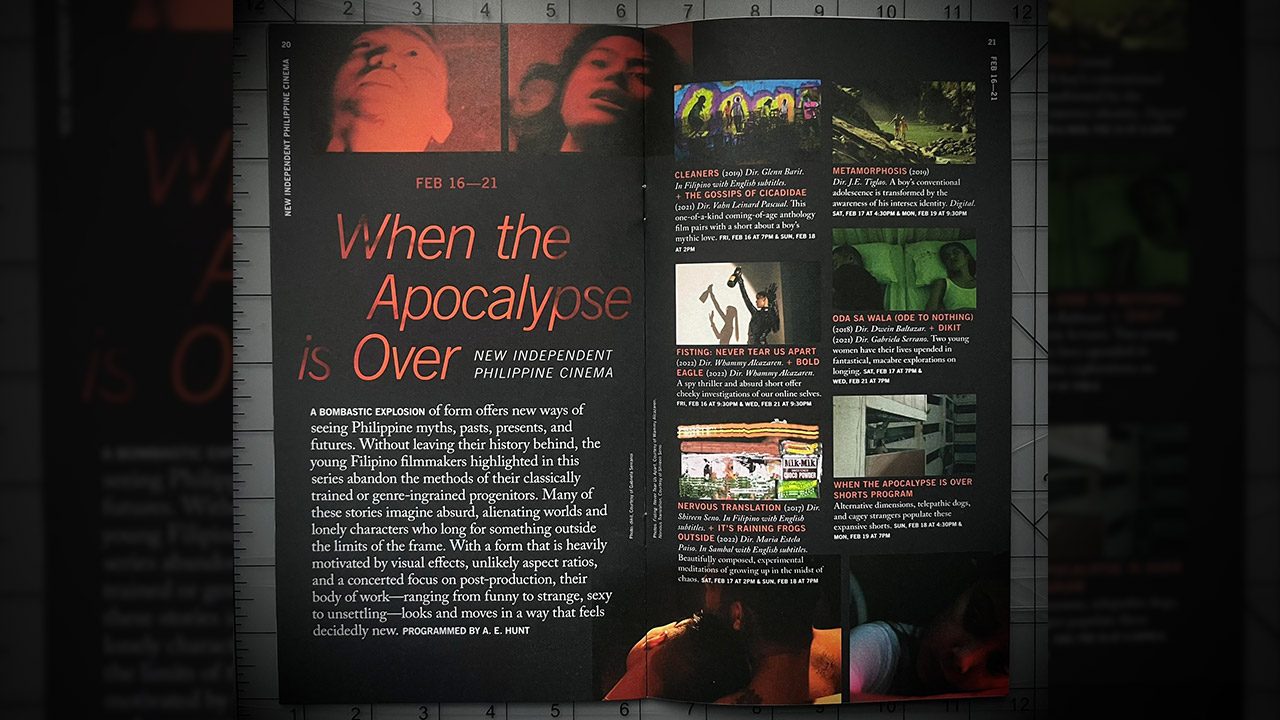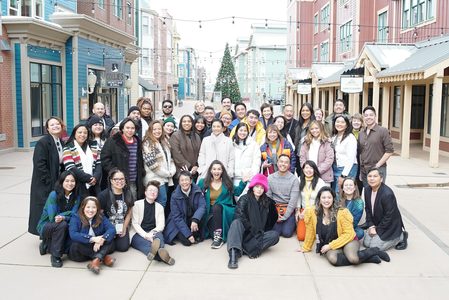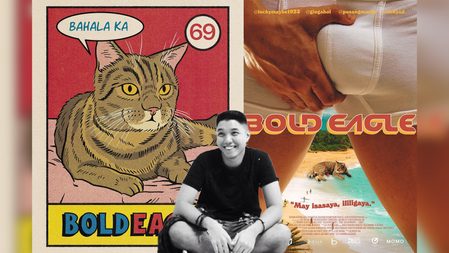SUMMARY
This is AI generated summarization, which may have errors. For context, always refer to the full article.

In 2020, filmmaker and writer Aaron Hunt was stuck in his home when two parallel journeys began: his search for his Filipino relatives and his deep dive into contemporary Philippine cinema. Like many in the diasporic communities in the US, Hunt had been acquainted with legends such as Lino Brocka but hadn’t been initiated into the vibrant world of contemporary Philippine films. Four years after this initial excursion and two years after pitching the program to Ashley Clark, the curatorial director at the Criterion Collection, this initial private interest has turned into an overdue celebration of Filipino artistry that is beginning to travel the world.
Before it is released on the Criterion Channel in May, the program titled When the Apocalypse is Over: New Independent Philippine Cinema will debut as a six-day assembly of features and short films at the Brooklyn Academy of Music (BAM). With features from established filmmakers Shireen Seno, Dwein Baltazar, Whammy Alcazaren, J.E. Tiglao, and Glenn Barit, and short films from emerging voices like Celeste Lapida, JT Trinidad, Trishtan Perez, and Stephen Lopez, When The Apocalypse is Over highlights work from the late 2010s and early 2020s from artists who are knee-deep in their exploration of where Philippine cinema can go without abandoning their personal or political roots.
I spoke to Hunt over Zoom weeks before the program is set to debut in mid-February about his early introductions to Philippine cinema, working as a theatrical booker and film programmer in New York, and the process of mounting and curating Philippine films as a self-proclaimed outsider.
This interview has been edited for brevity and clarity.
I knew you grew up in Illinois and are now based in Brooklyn. When did you first encounter Philippine cinema?
It was in my late teens and it was watching [Lino Brocka’s] Manila in the Claws of Light (1975). If you’re from the US, [it’s] typical [for that to be a starting point], but that was my first exposure to Philippine cinema. I don’t know how much we wanna get into my family background. My dad is Filipino. But he was adopted by an American family who was stationed in the Philippines and brought back very young. So maybe I was exposed to Philippine cinema later in life than other diaspora. Film was kind of like one of my first ways of connecting with Filipino culture as well.
When did you start actively seeking out films from the Philippines? Was that tied to your work as a programmer? Or was that interest there beforehand?
I started getting into it during the pandemic. In 2020, when things slowed down, I was out of work ‘cause I worked in film production at the time. So during that time, I was trying to find my biological family in the Philippines, my dad’s blood relatives. They had connected in the ‘90s but they lost touch. They were just writing analog letters to each other and those family members had to move, so they lost touch. I was just going through those old letters and searching for them through Facebook. And in the midst of all that, I was watching more Philippine cinema. Trying to see more of what was out there. I started finding [out] there was so much more than Brocka and commercial cinema. There’s just a lot and I happen to love a lot of it.
I know you’re a theatrical booker and a distributor. That isn’t a common occupation here in the Philippines. Could you talk more about it and how you got into it?
I’m a freelance theatrical booker, which is a strange and rare occupation even here in New York. I find there’s an increased demand for it here to the point where different distributors are looking for theatrical bookers but just can’t find one. I’m just too busy to take on everything here. Distribution is not something I thought about ’til the pandemic. It’s just not something that’s taught really in film school or anywhere else and when it is talked about, it’s talked about in a narrow-minded way rather than about what distribution could be. So I’m grateful for Dedza [Films] because it made me do research into different histories of distribution, filmmakers taking charge of distribution, and things like that. It helps that I have theatrical connections and was already booking cinemas. [But] I have limited time to put towards this because I’m not getting paid to book the program. So I’m just pitching it to cinemas in my free time. But I’m grateful to have those resources. I didn’t expect BAM to play it for so long — for five days. [That’s] pretty much all of the program except for a few films.
You were involved in the creation of the 9-film omnibus ‘Who Will Start Another Fire under Dedza,’ which was also screened in cinemas and streamed on the Criterion Channel. Were there things you carried over from that experience onto programming ‘When The Apocalypse is Over?’ Or anything you wanted to leave behind?
Yeah with Dedza, we found a lot of these films while we were doing research, looking for short films, and doing open submissions. Of course, I was partial to anything from the Philippines. I was very curious about it. So that’s when I first watched [Maria Estela Paiso’s] It’s Raining Frogs Outside and [Gabriella Serrano’s] Dikit. With Dedza films, that program was more of an initiative. We selected those films [through] a collective process with a programming committee and different people were considering [other] things: like this might not be the best film but it shows the potential for this filmmaker to grow or the background of this filmmaker is. Are they plugged in already? We weren’t sure if we would be able to do another anthology and ultimately we were not able to, so we [just wanted to] put as many people into this program as possible that might not have gotten into Criterion or theatrical release.
For this, it was different. I didn’t have all of that in the back of my mind. I’m an outsider coming to bring films from the Philippines to the US. I can’t deny that. It was interesting to me that a lot of these films played at Western festivals [though] I do think they translate to audiences here in a pretty direct way. In programming this, I tried for it to be more about enjoyment. A lot of these films are just so loved and I wanted to see them play here. I hadn’t seen them on a big screen. As these films started to accumulate, I noticed this focus on postproduction, VFX, animation, or not even that, just the frame and the texture of the canvas. Maybe this is partially inspired by or a response to being a little more isolated during quarantine.
In another interview with Jason Sondhi of Short of the Week, you said that Dedza films curatorially prioritized films that were not just purely ‘issue films.’ In the Philippines, as in many other countries from the Global South, there are a lot of those. What was the process of sifting through the shorts and features? Were you resisting anything artistically in making the program?
It’s hard. It’s not a set of attributes that an “issue film” has over “non-issue films.” It’s just an intuition that I have for films that seem to be appealing to festival trends. I don’t know. I feel like it’s something you feel or something you learn to feel after seeing a lot of films that are submitted places or films played at festivals. I talked to this filmmaker Daisuke Miyazaki and we talked about how he could tell when filmmakers are making things that they’re not interested in. You can just tell that they’re not genuine and that’s hard to break down into a binary or pick out certain attributes that show a film is that. I think it’s more complicated than that.
There were films that I watched that people recommended that seemed to lean into a more contemporary version of the “poverty porn.” I did feel some of the films that were recommended to me leaned into that a bit. I honestly would just ask my friends who are in the Philippines. I mean, I do know a lot of people from this program, and in trying to get more of a gauge of what people there on the ground are thinking, I would talk to them and defer to friends there for their first-hand experience because I am outside of that context.
At what stage in the process did the Brooklyn Academy of Music (BAM) become involved?
Similar to the Dedza program, I wanted to get as many Filipino films as possible on the Criterion Channel. The exact number of films in the program has fluctuated back and forth. But it was this larger program that was made to stream. But since late last year, maybe early fall or winter, I started looping in theaters. It’s already played at some smaller cinemas. I send them the whole program or potential variations because this is a lot for cinemas to show. Most cinemas in the US can’t afford to show this big of a program over so many days. It’s like a “risk” that so many cinemas now are not willing to take. You’re lucky if they’re able to book a film for a week. So often now, they’ll book a film for one day. If they do well on that one day, maybe they’ll expand it to one more day. So it’s very rigid and conservative for US theaters right now.
With that in mind, I would propose variations they could take on or not. It was just a collaboration with each cinema and what they were most interested in. There are many different iterations of the shorts block and I’m curious how the order [affects how it] has played to people. With BAM specifically, we decided to do a lot of double features — that’s something they were interested in and largely proposed. They also proposed a block of shorts that I rearranged. It’s a collaboration with each cinema to fit what would suit their audiences or programmer’s interests.
Why the title ‘When The Apocalypse is Over?’
Yeah, why that? [Laughs] I started watching a lot of these films during the pandemic. Some of them like It’s Raining Frogs Outside are more explicitly about a literal apocalypse, an external event keeping people isolated, or about what people do in that isolation. But also it speaks to a broader thing in all of the films: wanting to imagine something different. Or a frustration with the certain limits of reality. I like this idea of when this shit we’re going through is finally over…what else can we dream of?
Could you talk about why you decided to pair the particular films? What were the seeds of the program?
For [Glenn Barit’s] Cleaners and [Vahn Pascual’s] Gossips of Cicadaes, I was struggling for a while to think of a short that would pair with Cleaners. And they still don’t quite have a clear narrative throughline. But Gossips was imitating a silent film with a postproduction process that makes it black-and-white and a faux grain. Very simply that pairing was thinking of how they both are connected with the texture of the medium. They’re both so broad with their emotions. They end with this earnest romantic note. It’s in a similar vein as the emotions of Cleaners.
Some of these were their proposals. Like [Dwein Baltazar’s] Oda sa Wala and Dikit was Jesse [Trussel]’s proposal, who is the film programmer and director of Film Program and Strategy there at BAM. That was his idea. The features came out earlier than the short films [in] around 2017-2019. [As someone] from the US watching these films in succession, Cleaners and other films from that time or that generation seemed to have a tangible impact on some of the short films in the program and the way they’re playing with form. It’s Raining Frogs Outside and Dikit were early [picks]. Fisting was huge. BOLD EAGLE was not a part of it until BOLD EAGLE came out. [Shievar Olegario’s] Octogod was one I really loved. I only found [Jet Leyco’s] For My Alien Friend recently honestly and I wrote it into the program. Those two are so cool and they’re made around the same year — so many similar VFX and ways they’re playing with form. They’re bizarre and in discussion with each other in an interesting way.
In the process of making the program, did you learn anything about the context of the Philippines? Anything that shocked you through the films themselves or by being in communication with the filmmakers?
First, I learned just how vibrant the community there is. My journey searching for my family and connecting to my homeland coincided with finding these films and my first trip to the Philippines was also meeting a lot of these filmmakers for the first time. I was staying with the filmmaker Mike de Leon and he would show me all of the locations where older Filipino films I had been watching over the years were filmed. I don’t know. That has always been bound up with each other.
Being in New York, a lot of the programs are so academic and dry and the conversations afterward are dry, even if they’re showing something exciting. A lot of the programming is not fun. [Laughs] This cinema, the films in this program, they’re fun. They make me feel something. With Cleaners, I cried in scenes that didn’t even make sense. It’s just a bunch of films that make me feel something but also, in a way that is very innovative in form, in how they’re pushing the boundaries with their aesthetics. Even For My Alien Friend, which is the most experimental film in the lineup, that film is still funny in parts and still has feeling there. Whereas there’s a lot of Western experimental film, there’s this…I don’t want to create this binary, but yeah. It’s just cold, academic, and dry. So it’s just something fun and I think, I mean there’s a lot of Filipino diaspora living here. There are some from the Philippines and some who grew up here. I know they’d just love to know that there is not just one or two or three films that are fun, vibrant, and play with style. There are several generations doing something cool they might resonate with. – Rappler.com
‘When the Apocalypse is Over: New Independent Philippine Cinema’ is screening at the Brooklyn Academy of Music from February 16-21, 2024. Tickets are available here.
Add a comment
How does this make you feel?


There are no comments yet. Add your comment to start the conversation.